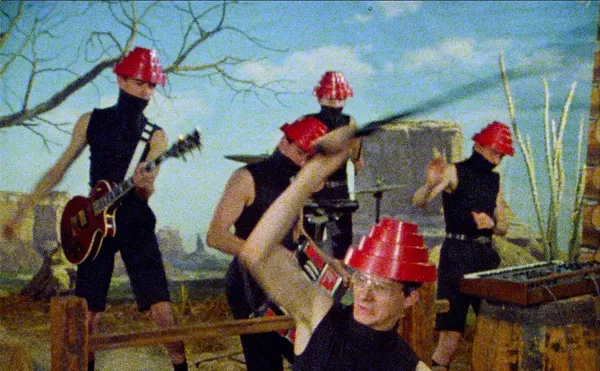Pablo Picasso said, "It takes a long time to become young." And Elaine Stritch proves him right. At 82, the actor, singer and Broadway legend sees the world with wisdom, humor and simple wonder. And that's what makes her Emmy- and Tony Award-winning one-woman play, Elaine Stritch at Liberty, nothing short of spectacular.
On a recent afternoon Stritch shows up with her musical director, Rob Bowman, in the lobby of the Townsend Hotel in Birmingham. She's dressed all in beige: a button-up shirt, slacks, a 3/4-length fur, a brimmed hat and a men's tie secured with an antique cameo stickpin. Bright-eyed, gritty-voiced, looking through an oversized pair of amber-tinted glasses, she exudes classic show-biz glamour, the kind that takes command of a room. She warns that "Why did you become an actor?" is a mundane question that she doesn't like to be asked. But she also jokes that she only started acting to get a better table at Sardi's.
After ordering a nonalcoholic beer with two chilled wine glasses and ice, she settles into a high-backed plush armchair and starts to recall some of the experiences and ideas that made her decide to create At Liberty. Hearing her speak about kindness, character, recovery, and self-love isn't much different from seeing her on stage. She weaves in and out of her personal philosophies and memories with show tunes, anecdotes and jokes.
"Easy does it" is one of her mantras. In other words, no matter what life hands you, don't overdo it. She's intense and at ease at the same time. At any given moment, she could evoke laughter or tears. When she talks about friendship and how she found joy in life, she starts singing "Make Someone Happy" from the musical Do Re Mi. She calls the song the most brilliant thing she's ever heard.
"And here's the message, which is so true," she says. Then she pauses and lowers her voice as she sings the final lines, "Make someone happy ... And you will be happy too."
Stritch calls At Liberty a "stand-up biography." She wrote it with John Lahr, senior drama critic at the New Yorker and son of the actor and vaudeville performer Bert Lahr. It covers her life and career up to 1987 and may be a starting point for a future written biography. In it, she shows her inner raconteur as she recounts her school days at a convent, studying acting with Marlon Brando in New York, losing her husband to cancer, and her battle with alcoholism. On stage she's ageless, moving with energy and grace. Each line is delivered with carefully measured emphasis and near-perfect timing. But the most powerful thing about the performance is that she's only acting in order to tell the truth.
"I tell the truth," she says. "So I recognize the truth in others."
Stritch grew up in northwest Detroit near the University of Detroit Mercy. After finishing high school at the Sacred Heart Convent, a place where she never quite "fit in," she moved to New York.
"I arranged with the Reverend Mother to go to a finishing school," she says. "I told her I needed to become an actor, and I had no idea why. The ceilings were too low back home. I needed higher ceilings."
Higher ceilings are exactly what she found — or perhaps created for herself — when she went to New York to begin her acting career. In 1947, Stritch made her debut in the Broadway revue Angels in the Wings. She went on to star in many productions for theater, film and television. In the early 1960s, Leonard Bernstein saw her perform at a benefit in New York, and he told Noël Coward he had to see her. Soon after, she starred in Coward's musical Sail Away. She counts Coward, along with Woody Allen and Stephen Sondheim, among the most talented people she's ever known.
"Working with Coward was the most wonderful thing that ever happened to me," she says. "He's an experience. And he loved me. When a talented person loves you, it's a great compliment."
Stritch appeared in Allen's September in 1987 and Small Time Crooks in 2000. She did two movies in 2005, Monster-in-Law with Jane Fonda and Jennifer Lopez and Romance & Cigarettes with Susan Sarandon and Steve Buscemi. In 2007, she won an Emmy for her guest appearances on the NBC-TV series, 30 Rock.
It's been six years since she won a Tony for At Liberty, but the show's been so successful and well-received it's still being reprised. Fellow actor Billy Crystal told Stritch it inspired him to do his own one-person show. In 2004, D.A. Pennebaker made the documentary Elaine Stritch at Liberty.
There's an exhaustive list of hits in her career but a few misses as well. In the mid-1980s, she was slated to be part of the cast of the NBC sitcom The Golden Girls, but was dropped because she didn't get along with one of the show's writers. Her friend Bea Arthur ended up getting the role.
"I blew The Golden Girls," Stritch says. "Because I expressed myself at the reading. And the truth I got out of that experience was if I can't be myself with the writer, get me on a plane."
In her show, Stritch shares these show-biz tales and gives a poignantly honest account of her alcoholism and recovery. But mostly, the two are interwoven. She says she started drinking to cope with stage fright. And one of the most devastating moments in her life was when she realized she was an alcoholic.
"Untalented people can't wait to get on the stage," she says. "It's the talented ones who are afraid. They're afraid of their own talent. I no longer have that sick fear that made me need a drink in order to perform."
Many people ask Stritch if At Liberty is the last show she'll do. She's not sure. But with her tenacity and tireless passion for both acting and living, there'll always be plenty of material for a sequel.
Elaine Stritch at Liberty runs at the Jazz Café at the Music Hall at 8 p.m. Oct. 31 and Nov. 1, and at 7 p.m. on Nov. 2. For tickets call 313-887-8500 or see musichall.org.
Norene Cashen is a freelance writer for Metro Times. Send comments to [email protected]





